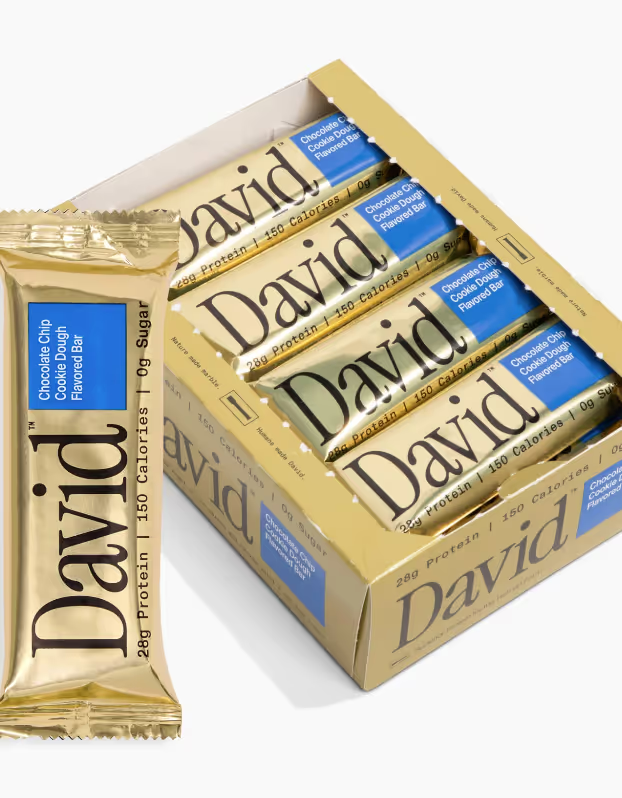David’s Protein Bars: High in Hype, Low in Substance? Here’s Our Review
Our take on the popular David's Protein Bar.

A primary care membership for patients who want more. Primary Care. Nutrition. Wellness. All under one roof.
You may have heard the buzz around David’s Protein Bars, the protein-packed snack co-founded by Peter Rahal (of RXBar fame) and Zach Ranenan. With support from wellness powerhouses like Peter Attia and Andrew Huberman, these bars are flying off shelves and into gym bags everywhere.
At first glance, they seem like the perfect protein bar:
Nearly 30 grams of protein
Low in calories
Zero sugar
But while the branding is sleek and the macros look good on paper, our Wellness Advisors have some serious reservations. Here's what you need to know before you stock up.
Artificial Ingredients
One of the most concerning changes in David’s Protein Bars formulation is the addition of sucralose—a widely used artificial sweetener also known by the brand name Splenda. While it’s marketed as a calorie-free sugar substitute, sucralose has been linked to potential health risks, including concerns around gut health and even cancer in some animal studies.
A notable study published in the Journal of Toxicology and Environmental Health found that sucralose may alter the gut microbiome and reduce beneficial bacteria, potentially leading to long-term health implications.
(Abou-Donia MB et al., 2008. "Splenda Alters Gut Microflora and Increases Intestinal P-Glycoprotein and Cytochrome P-450 in Male Rats")
Sugar Alcohol Overload
David’s bars also contain 9 grams of sugar alcohols, which might help keep the sugar content low, but often come at a cost. Sugar alcohols such as maltitol and allulose can cause digestive distress—bloating, gas, and that all-too-familiar post-snack stomach ache. If you've ever felt "off" after a protein bar, sugar alcohols may be the culprit.
No Fiber? No Thanks.
One surprising omission from David’s bars: fiber. While we’re constantly being told to up our protein intake, the real nutrient most Americans are lacking is fiber, which is essential for digestive health, blood sugar balance, and long-term disease prevention.
For a bar that markets itself as wellness-forward, skipping fiber is a red flag.
What Should You Look for in a Protein Bar?
Our Wellness Advisors recommends looking for bars made with real, whole-food ingredients, a good balance of protein and fiber, and minimal artificial sweeteners or additives. You want something that supports your gut and your goals—not just your macros.
Better Bar Options
Looking for a protein bar that actually supports your health? Here are our top picks:
- Jacob’s Bars – clean ingredients, great texture, and naturally sweetened
- ALOHA Bars – USDA organic, plant-based, and fiber-rich
- B.T.R. Bars – functional ingredients and zero junk
- Raw Rev – raw, vegan, high-fiber, and satisfying
Final Thoughts
David’s Protein Bars may have the right influencers behind them and impressive macros at first glance, but we believe that true wellness goes beyond the label. With artificial sweeteners, sugar alcohols, and no fiber, these bars fall short of what we expect from a health-conscious snack.
If you're serious about nourishing your body, you're better off reaching for a bar that aligns with your long-term health—not just your short-term gains.

If you're curious to learn more about The Lanby, book a free consult call and we'll chat about how The Lanby can be your personalized long term health and wellness partner.

Kendall is a graduate of the University of Mississippi, with a B.A. in Integrated Marketing Communications and a minor in Business Administration. She received her certificate of Nutrition Science from the Friedman School of Nutrition at Tufts University.

Chloe holds a bioengineering degree from the University of Pennsylvania. As a breast cancer survivor, her insights shape The Lanby's patient-centric approach. Leveraging her healthcare strategy background, Chloe pioneers concierge medicine, bridging gaps in primary care.

Tandice was recognized with the Health Law Award and named a Ruth Bader Ginsburg Scholar at Columbia Law School. Tandice's editorial role is enriched by her insights into patient autonomy and gene modification legalities. Passionate about bioethics, she is committed to crafting patient-centric healthcare solutions.





